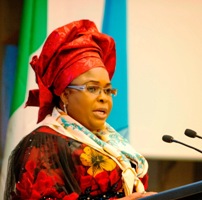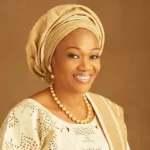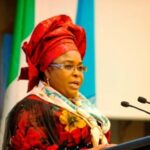In her acceptance speech after being sworn in as a permanent secretary in the Bayelsa State civil service, Dame Patience Jonathan made a passionate appeal that First Ladies should be given a constitutional role in our political system. It might be this lack of a constitutional role that pushed her into seeking promotion in the civil service. The week of her swearing in also provided the occasion for the bitter conflict between her and the previous occupant of the position, Hajia Turai Yar’adua over land allocation for their “pet projects”.
Over the 25 years, the First Lady phenomenon has created a dynamic in which political space is being appropriated and used by the wives of the men in power, for their personal aggrandisement, rather than for furthering the interests of women and the wider society. The First Lady syn- drome is a new international political phenomenon that has been traced to the 1992 World Summit for the Eco- nomic Advancement of Rural Women hosted in Geneva at the initiative of six First Ladies, three of whom, Mar- yam Babangida, Elizabeth Diouf and Suzanne Moubarak, were Africans. For the first time, wives of heads of states sought to play an autonomous and co- ordinated role in international politics in their capacities as wives. The First Lady syndrome, however, first hit the international limelight in the 1995 Beijing Conference when a large group of First Ladies met in a context of a major world event and took the limelight. In Africa, the First Ladies Summit was first hosted in Yaoundé, Cameroon, by Paul Biya’s wife, Chantal Biya, during the 1996 OAU Summit. The communiqué of the meeting, which focused on strategies to improve the lives of rural women, was incorporated into the official communiqué of the OAU meeting.
Nana Rawlings was the first great African First Lady. During her husband’s rule, she had no official position in government but was all the same playing a major role in formulating and even implementing policies relating to women. The main organisational structure that Nana Rawlings developed was the 31st December Women’s Movement (DWM), named after the second coming to power of her husband in 1981. The DWM was a huge organisation with about 30 affiliate organisations and claimed a membership of over two million members rooted in the countryside. Nana Rawlings was able to appropriate concerns that are current in the international development community about the necessity of focusing on rural and poor women.
While Ghana was the first African country that gave institutional prominence to the First Lady syndrome, Nigeria is the country where it has flourished the most. The late Maryam Babangida was the pioneer when her husband became president and she opened a First Lady office for herself in the presidency and became a prominent figure in Nigeria’s public life. This would be the first time that the wife of a Nigerian head of state would use her spousal position as a basis to play a prominent role in the nation’s public life.
In 1987, Mrs Babangida launched the Better Life for Rural Women Programme (BLP). The wives of all senior state officials were incorporated into the organisation. The wives of military governors in the states became chair- persons of the state BLP and wives of local government chairpersons acted likewise at their level. A lot of state resources were unofficially channelled to the BLP and major fairs that got a lot of publicity were organised. The BLP claimed to have made a major contribution to improving the lot of rural women. The claims include the organisation of 10,000 co-operatives, 1,793 cottage industries, 2,397 farms,470 women’s centres and 233 health centres. Most serious observers are, however, of the view that all these figures were concocted and nothing tangible happened.
In 1990, the National Commission for Women (NCW) was established as the official state organ charged with handling women’s issues. The establishment of the NCW was in fact first announced in President Babangida’s message to the launching of Maryam’s biography, The Home Front, on 19th September 1988. Mar- yam Babangida therefore must have believed it was created for her. When, however, the NCW under the leader- ship of Professor Bolanle Awe tried to establish the organisation as an autonomous body with full competence in handling all issues relating to women, Maryam got very upset. Her baby was trying to become a rival organisation. She had security officials arrest and bundle out Professor Bolanle Awe from NCW.
Dame Patience Jonathan and Hajia Turai Yar’adua should recall what happened subsequently. To establish a permanent place for herself in history, Mrs Babangida obtained public money through her husband whom she used to establish a huge edifice in Abuja which she named the Mar- yam Babangida Centre for Women and Development. In 1992 when it appeared that they might have to leave office soon, Mrs Babangida applied to the Corporate Affairs Commission to register the Centre as a Trust, with her son Mohammed as Trustees for life. The application was queried by the Commission because they had not gone through the due process of advertising the Trust in three national dailies and obtaining a security clearance (The News 25/7/94). The Centre was registered as she had wished anyway as a property of MIB (Maryam Ibrahim Babangida) Foundation.
In 1993, General Sani Abacha took over power and his wife, Mariam Abacha, became the First Lady and occupied the office established by her predecessor. Her eldest daughter, Zainab, then had the brilliant idea of also opening her office of the First Daughter in the Presidency. Mariam Abacha was sufficiently confident of her powers to openly declare in a BBC interview that although she was not taking decisions herself, ministers and even foreign diplomats who are seeking for an appointment to see her husband come to see her and she has the capacity to fix their problems (Punch, 4/11/99). In their “professional careers” as wives of army officers, Mariam Abacha had developed an apparent rivalry with Maryam Babangida. Having got her turn, she set out to dismantle the work of Mrs Babangida. The BLP was dissolved and a “new” similar organisation, the Family Support Programme (FSP) was established. A state instrument to implement it, the Family Economic Advancement Programme, was also set in motion and significant state funds were devoted to it. State officials were incorporated into the structure, just as Maryam Babangida had done. The Maryam Babangida Centre for Women and Development was taken over by the state and renamed the Women’s Centre. Power is ephemeral. Maryam Abacha for her own posterity established the Maryam Abacha Hospital for Women which was also taken over and converted into the National Hospital.
There is one positive narrative of a Nigerian First Lady, Justice Fati Abubakar, whose husband was Head of State in the one-year interregnum following the death of Sani Abacha. General Abdulsalam Abubakar’s wife, a High Court judge, established Women’s’ Rights Advancement and Protection Alternative (WRAPA). Unlike the two previous First Ladies, she started by formally registering the organisation. She also refused to use her husband’s position to make state governors and government departments contribute to WRAPA’s purse or acquire land allocation by political fiat. WRAPA today is generally recognised as one of the most serious and most effective non-governmental organisations fighting for the advancement of women’s human rights in Nigeria.
The syndrome, however, returned after Mrs Abubakar. On 24 June 2003, the late Stella Obasanjo called the wives of state governors to Abuja and publicly declared that: “There is only one First Lady in Nigeria. Period.” (Africawoman no 4, 2003:1). She warned them in front of television cameras that there was only one First Lady in the country and her name was Stella Obasanjo. She directed them to stop using the title First Lady of their husband’s states and revert to their proper title of governor’s wives. As Turai Yar’adua and Patience Jonathan fight over the future legacies, they should take time to reflect on past legacies.

 Join Daily Trust WhatsApp Community For Quick Access To News and Happenings Around You.
Join Daily Trust WhatsApp Community For Quick Access To News and Happenings Around You.


